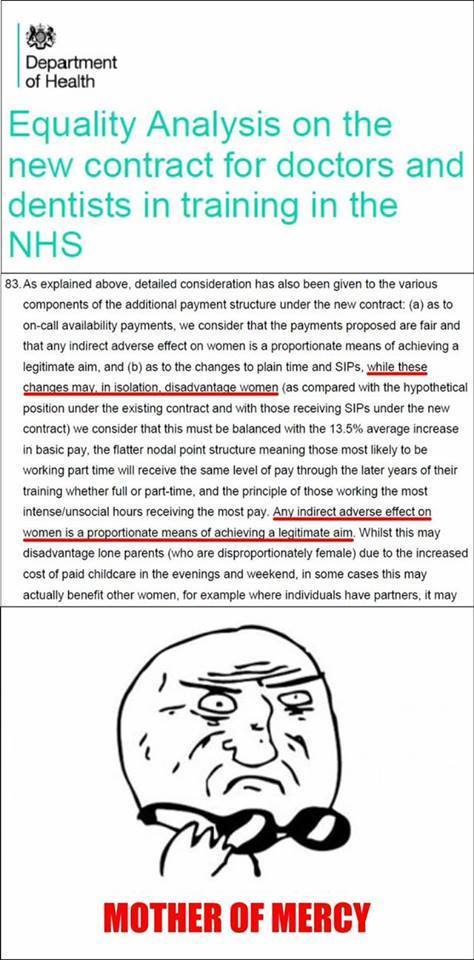#notfair
Following on from my post where I explained one of the reasons why Junior Doctors are so concerned about the safety of the new Junior Doctors contract this post will look at why Junior Doctors are so upset about the unfairness of the contract which will be imposed upon us from August 2016.
The current anger being expressed and headlines generated around fairness comes from the Department of Health’s companion documents to the new contract, an Equality Assessment and a Family Test. These can be read here.
The tone and language of these documents have angered a large proportion of the medical profession, not just Junior Doctors. We have seen responses from the Presidents of the Royal College of Physicians and the Royal College of Surgeons
We are very concerned by the language in the government’s own equality analysis of the contract, which warns that features of the new contract ‘impact disproportionately on women’.
The President of the Royal College of Pathologists
I am also concerned that these changes might discourage women from entering medicine generally and entering traditionally female-dominated specialties, like pathology, in particular. It is essential that opportunities in all specialties are open to all junior doctors, irrespective of their sex and parental status.
and the Royal College of Psychiatrists
We are greatly concerned that this will adversely impact on morale amongst female doctors, and may serve to push women away from a career in psychiatry.
The issue also brought Junior Doctors back into the media spotlight with many articles written including in the Guardian (female doctors may be forced to quit over new contracts) and the Independent (Junior doctors outraged over new contract that ‘discriminates against single women’)

meme shared by many following the release of the EIA
The problems with the contract are multiple, complex and intertwined. In brief a few key problems include:
- The government has replaced a simple system (banding) with a complicated one (work scheduling)
- Reducing out of hours payments
- They have removed annual pay progression, which without mitigation was always going to lead to indirect discrimination.
- They are unable to understand the working lives of Junior Doctors.
Our previous contract had payments based on a banding given to Junior Doctors depending on the proportion of out of hours work they were required to do. The new contract replaces this system with individualised work scheduling. This is leads to an incredible sequence of maths required to work out what each individual is going to be paid. Which becomes even more complicated for less than full time workers. It was inevitable, in what the government admits is a cost saving exercise, (‘to enable employers to roster Doctors when needed across seven days
including evenings and weekends more affordably’ Equality Analysis gov.uk) that some Junior Doctors would lose out.
The government claims that the purpose of the new contract is to reward out of hours work particularly nights more appropriately. But the new contract increases basic pay in a setting where overall pay is not going to increase. Therefore out of hours pay must be going down. The claim to be rewarding out of hours work is empty rhetoric.
The removal of annual pay progression is one key lever which makes the new contract indirectly discriminatory. It has been a government drive throughout the last 6 years to remove annual pay progression from contracts. There is some debate about the appropriateness of annual pay progression. (The idea being that you continue to improve while learning the job and therefore the ‘rate for the job’ should be a wage that you reach a few years down the line.) But what is clear is removing it will indirectly hit those on maternity leave, less than full time workers and those who take time out of training. Predominately women.
There are a number of other issues particularly around the pay for non-resident on-calls, (NROC) when a doctor is at home but is answering phone calls to provide advice, sometimes 20 or 30 times a night. I feel like NROC probably deserves a post on its own.
The government and NHS Employers could have spent more time negotiating with the BMA in order to try and work around these issues. The BMA had already negotiated heavily around these areas to try and mitigate the worst of the changes the government is determined to enforce. Instead they walked away and are determined to impose a contract that will indirectly discriminate more than 50% of the workforce. Who they view as little more than collateral damage.
There entire contract, equality analysis and family test show they continue to refuse to accept the working lives of Junior Doctors. Their justification for a raft of complicated changes is that Junior Doctors told them that they work to long hours and sometimes shifts are dangerous. This is true, but it has never been caused by our contract (on the contrary our current contract has gone along way to improving these conditions). What causes our long stressful days and nights is the crippling lack of Junior Doctors, Nurses, allied healthcare professionals and support staff at all times of the day, combined with an ageing population and the decimation of social care and the welfare state through austerity.
These are a political problems caused by this government. No wonder we think its unfair that we are being called the problem and not part of the solution.